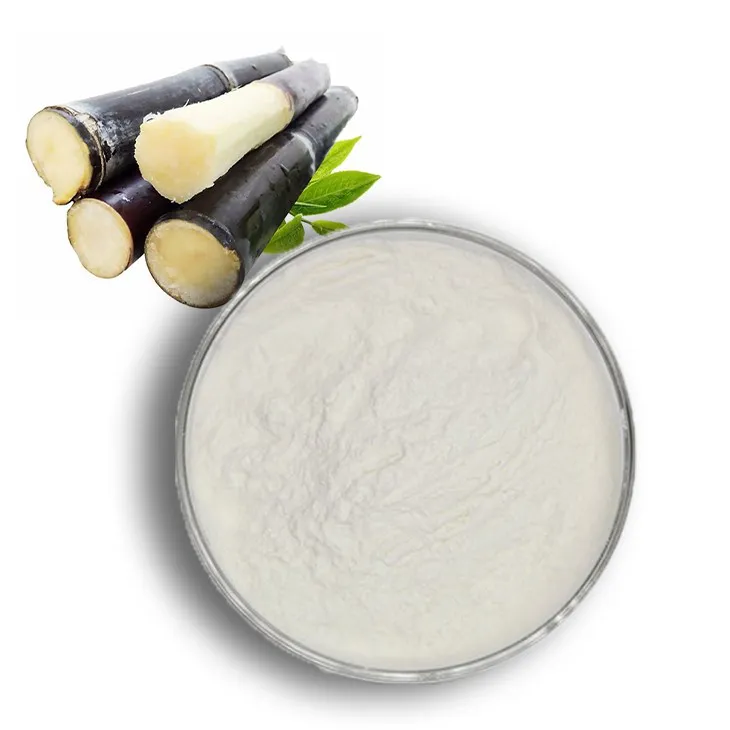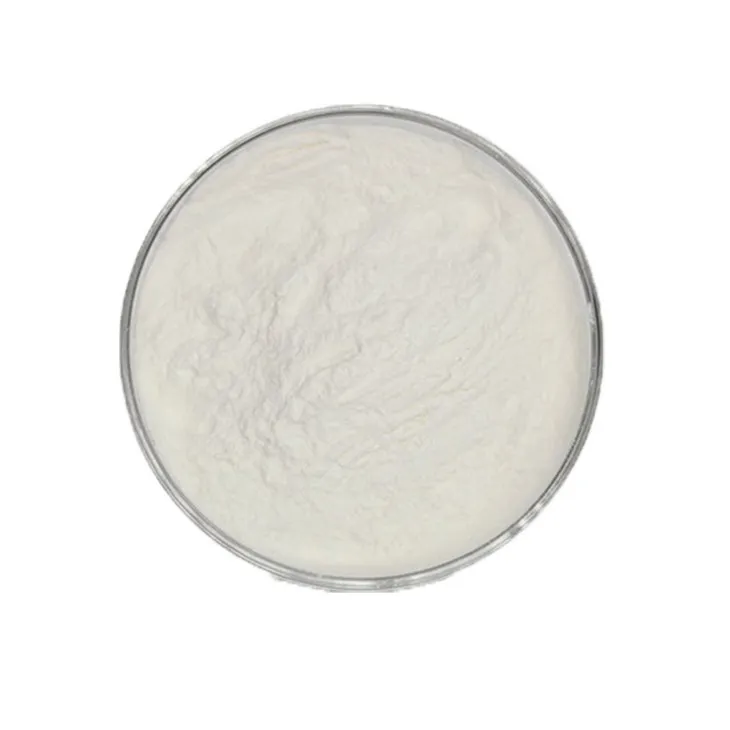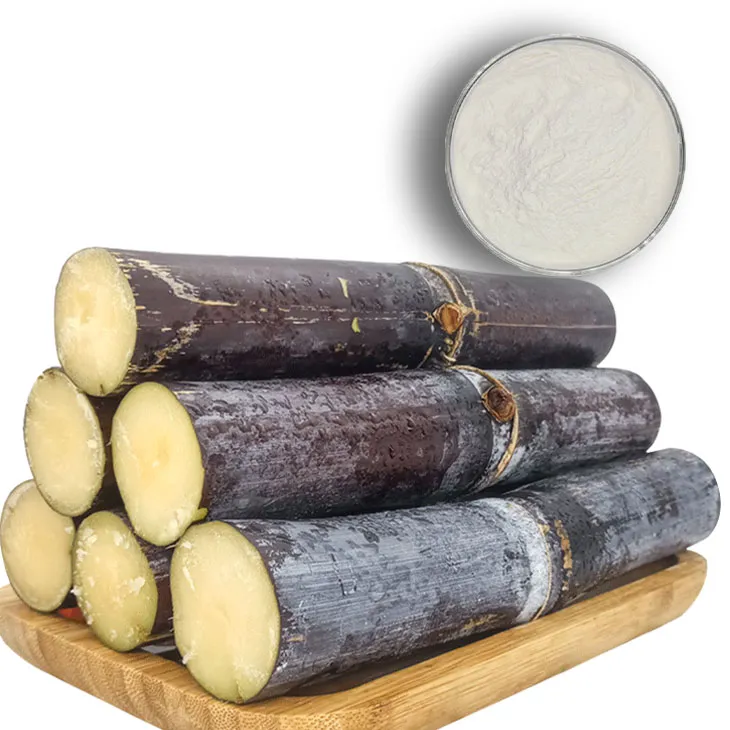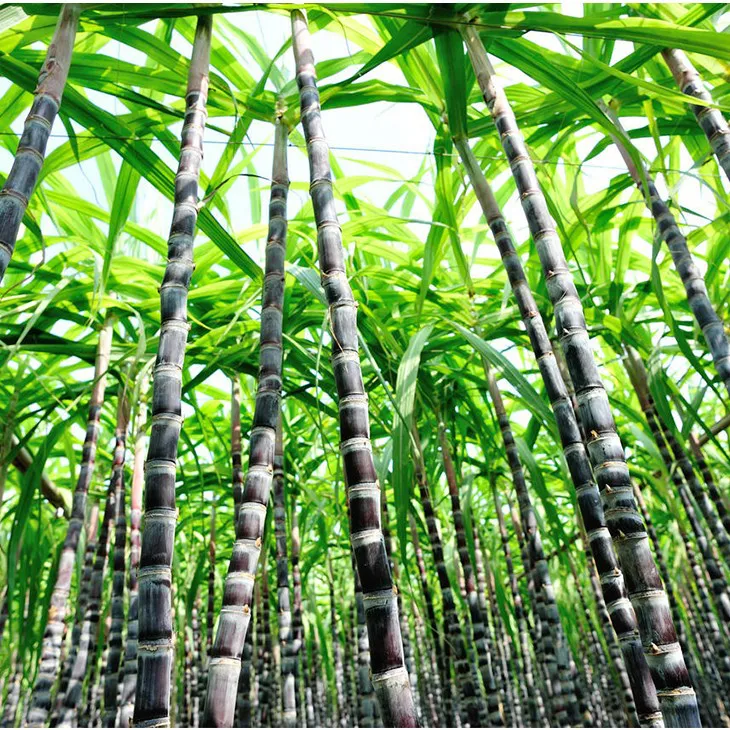- 0086-571-85302990
- sales@greenskybio.com
Read our comprehensive primer on high - quality organic sugarcane extract.
2024-12-31

Introduction
Organic Sugarcane Extract has been gaining significant attention in recent years. It is a natural product that offers a plethora of benefits, both in terms of health and various applications in different industries. This comprehensive primer will take you on a journey to understand all aspects of high - quality organic sugarcane extract, from how it is produced to the ways it is making an impact in the modern world.

Production Process of Organic Sugarcane Extract
1. Organic Farming of Sugarcane
Organic sugarcane cultivation starts with the selection of suitable land. The soil must be rich in
nutrients and free from contaminants such as pesticides and heavy metals from previous non - organic farming
practices. Farmers use natural fertilizers like compost and manure to enrich the soil.
Crop rotation is also an important aspect of organic sugarcane farming. This helps in maintaining soil fertility
and preventing the build - up of pests and diseases. For example, sugarcane might be rotated with leguminous
crops which fix nitrogen in the soil.
Water management in organic sugarcane farming is crucial. The plants require an adequate amount of water, but
over - irrigation can lead to water - logging and subsequent root rot. Drip irrigation systems are often used to
ensure that water is supplied efficiently.
2. Harvesting
The timing of harvesting is critical for obtaining high - quality sugarcane. Sugarcane is typically harvested
when it reaches its peak maturity. This is determined by factors such as the sucrose content in the stalks.
Manual harvesting is still common in some regions for organic sugarcane. Skilled laborers use machetes to cut the
sugarcane stalks close to the ground. This method is preferred in organic farming as it allows for more
selective harvesting, leaving behind immature or diseased stalks.
In larger - scale organic operations, mechanical harvesters may be used. However, these machines need to be
carefully calibrated to ensure that they do not damage the sugarcane or contaminate it with non - organic
elements.
3. Extraction Process
Once harvested, the sugarcane is immediately processed to extract the juice. The traditional method involves
crushing the sugarcane stalks between large rollers. This mechanical process squeezes out the juice, which is
then collected.
Modern extraction methods may also include the use of centrifugal force to separate the juice from the fibrous
part of the sugarcane more efficiently. The extracted juice is then filtered to remove any remaining solid
particles.
After filtration, the juice may undergo further processing depending on the desired end - product. For example,
if the goal is to produce organic sugarcane syrup, the juice is concentrated by boiling off the excess water. If
it is for an extract to be used in cosmetics or health products, additional purification steps may be involved.

Health Benefits of Organic Sugarcane Extract
1. Rich in Nutrients
Organic sugarcane extract contains a variety of essential nutrients. It is a good source of vitamins,
particularly vitamin C, which is important for a healthy immune system. Vitamin C also acts as an antioxidant,
protecting the body's cells from damage caused by free radicals.
It also contains minerals such as potassium, which is crucial for maintaining proper heart function and
regulating blood pressure. Potassium helps in the proper functioning of nerve cells and muscles as well.
Additionally, organic sugarcane extract has small amounts of iron, which is necessary for the production of
hemoglobin in the blood, thus playing a role in preventing anemia.
2. Antioxidant Properties
The presence of antioxidants in organic sugarcane extract is one of its most notable features. These antioxidants
help in combating oxidative stress in the body. Oxidative stress is associated with various diseases, including
heart disease, cancer, and neurodegenerative disorders.
Phenolic compounds present in the extract are among the main antioxidants. They scavenge free radicals and
prevent them from causing cellular damage. For example, flavonoids in the extract have been shown to have
anti - inflammatory and anti - cancer properties in some studies.
3. Digestive Health
Organic sugarcane extract can be beneficial for digestive health. The natural sugars present in it, such as
sucrose, are easily digestible. This can provide a quick source of energy for the body.
Moreover, it contains dietary fiber, which helps in promoting regular bowel movements. The fiber adds bulk to
the stool and can prevent constipation. It also aids in the growth of beneficial gut bacteria, which are
important for overall digestive function and a healthy gut microbiome.

Diverse Applications of Organic Sugarcane Extract
1. Food and Beverage Industry
In the food and beverage industry, organic sugarcane extract is widely used. It is a key ingredient in the
production of natural sweeteners. Organic cane sugar, which is made from the extract, is a popular alternative
to refined white sugar. It has a distinct flavor profile that is often described as having a more complex and
earthy taste.
Organic sugarcane syrup is also used as a sweetener in various products. It can be found in baked goods,
cereals, and confectionery items. In addition, some specialty drinks, such as certain types of cocktails and
non - alcoholic beverages, use organic sugarcane extract for its unique flavor and natural sweetness.
2. Cosmetic Industry
The cosmetic industry has also discovered the benefits of organic sugarcane extract. It is used in skincare
products due to its moisturizing properties. The extract can help in hydrating the skin, leaving it soft and
supple.
It is also used in haircare products. For example, in shampoos and conditioners, it can add shine to the hair
and improve its overall texture. The natural sugars in the extract can form a protective layer on the hair
strands, preventing damage from environmental factors.
3. Pharmaceutical Industry
In the pharmaceutical industry, organic sugarcane extract has potential applications. Its antioxidant and
anti - inflammatory properties make it a candidate for the development of drugs or supplements for various
health conditions.
For example, research is being conducted on its use in the treatment of diabetes. Some studies suggest that
certain components in the extract may help in regulating blood sugar levels. It may also be used in the
development of products for improving cardiovascular health, given its positive effects on heart - related
factors such as blood pressure and cholesterol levels.

Conclusion
High - quality organic sugarcane extract is a remarkable natural product with a wide range of applications and
numerous health benefits. Its production process, which emphasizes organic farming and careful extraction,
ensures that it retains its natural goodness.
As more industries recognize its value, we can expect to see even more innovative uses of this extract in the
future. Whether it's in our food, cosmetics, or pharmaceuticals, organic sugarcane extract is making waves and
is likely to continue to do so for years to come.
FAQ:
What is high - quality organic sugarcane extract?
High - quality organic sugarcane extract is a natural product obtained from sugarcane through specific extraction methods. It is organic, which means it is produced without the use of synthetic pesticides, fertilizers, or genetically modified organisms. It contains various beneficial components such as sucrose, vitamins, and minerals.
How is high - quality organic sugarcane extract produced?
The production process typically involves harvesting ripe sugarcane. Then, the cane is crushed to extract the juice. This juice is further processed through filtration and purification steps to remove impurities. For the organic variety, strict organic farming and processing standards are adhered to throughout the production cycle to ensure its organic status.
What are the health benefits of high - quality organic sugarcane extract?
It can provide a natural source of energy due to its sucrose content. It may also contain antioxidants that can help combat oxidative stress in the body. Additionally, some components in the extract might have anti - inflammatory properties and could potentially support digestive health.
What are the diverse applications of high - quality organic sugarcane extract?
It is widely used in the food and beverage industry. For example, it can be used as a sweetener in various products like juices, candies, and baked goods. In the cosmetics industry, it can be found in some skin - care products for its moisturizing and potentially antioxidant - rich properties. It may also have applications in the pharmaceutical industry for certain health - related products.
How can one ensure the quality of high - quality organic sugarcane extract?
Look for certifications such as organic certifications from recognized certifying bodies. Check the source of the sugarcane, ensuring it comes from reliable and organic - compliant farms. Analyze the product's composition and purity through laboratory tests if possible. Also, consider the reputation of the brand or manufacturer.
Related literature
- Organic Sugarcane Production: Best Practices"
- "The Nutritional and Therapeutic Potential of Sugarcane Extracts"
- "Sugarcane Extract in the Food and Cosmetic Industries"
- ▶ Hesperidin
- ▶ citrus bioflavonoids
- ▶ plant extract
- ▶ lycopene
- ▶ Diosmin
- ▶ Grape seed extract
- ▶ Sea buckthorn Juice Powder
- ▶ Beetroot powder
- ▶ Hops Extract
- ▶ Artichoke Extract
- ▶ Reishi mushroom extract
- ▶ Astaxanthin
- ▶ Green Tea Extract
- ▶ Curcumin Extract
- ▶ Horse Chestnut Extract
- ▶ Other Problems
- ▶ Boswellia Serrata Extract
- ▶ Resveratrol Extract
- ▶ Marigold Extract
- ▶ Grape Leaf Extract
- ▶ blog3
- ▶ blog4
- ▶ blog5
-
Bamboo Leaf extract
2024-12-31
-
Polygonum multiflorum extract
2024-12-31
-
Echinacea Extract
2024-12-31
-
Curcumin Extract
2024-12-31
-
Agaricus Blazei Extract
2024-12-31
-
Red Vine Extract
2024-12-31
-
Grape Seed Extract
2024-12-31
-
Reishi mushroom extract
2024-12-31
-
Peppermint Oil
2024-12-31
-
Red Wine Extract
2024-12-31





















